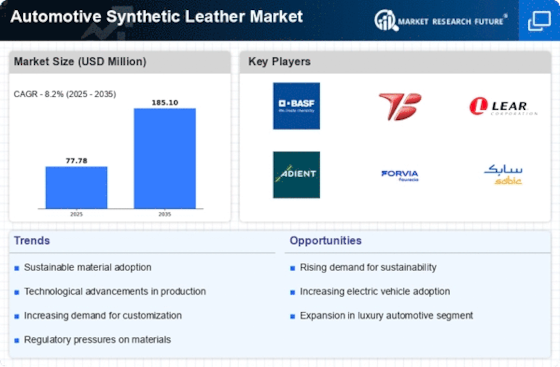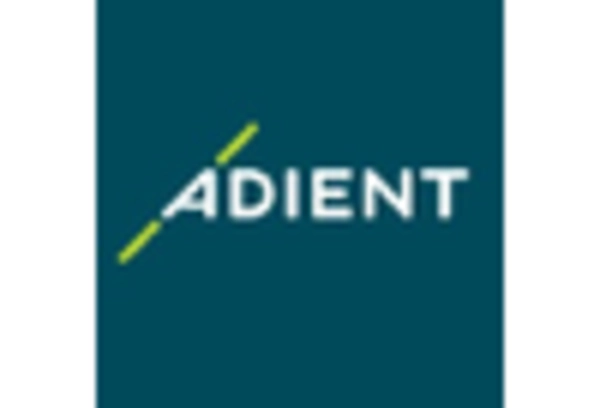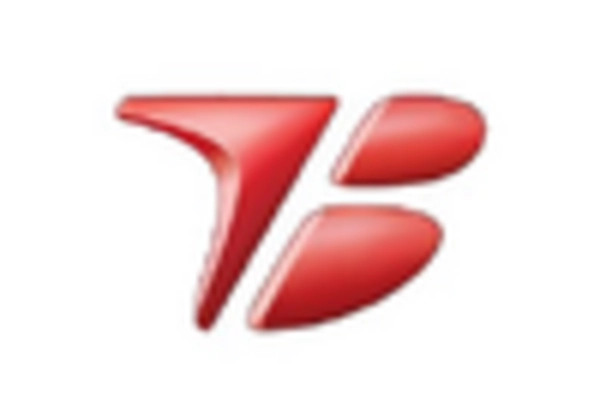Market Analysis
In-depth Analysis of Automotive Synthetic Leather Market Industry Landscape
The market dynamics of automotive synthetic leather are shaped by various factors that influence the supply, demand, and overall trends within the automotive and upholstery sectors. Automotive synthetic leather, commonly known as faux leather or artificial leather, has gained significant traction as a preferred material for car interiors. Understanding the market dynamics involves examining elements such as technological advancements, consumer preferences, sustainability considerations, regulatory impacts, and competitive forces.
Technological advancements play a pivotal role in the market dynamics of automotive synthetic leather. Continuous innovations in manufacturing processes, material formulations, and texture replication contribute to the development of synthetic leather products that closely emulate the look and feel of genuine leather. Advanced features such as enhanced durability, stain resistance, and ease of maintenance contribute to the popularity of synthetic leather in the automotive sector. Manufacturers investing in cutting-edge technologies can gain a competitive advantage by offering products that meet the evolving demands of consumers seeking high-quality and aesthetically pleasing interior options.
Consumer preferences are a significant driver shaping the market dynamics of automotive synthetic leather. As consumers become more ethically and environmentally conscious, there is a growing demand for sustainable and cruelty-free alternatives to traditional leather. Automotive synthetic leather, being animal-friendly, caters to consumers who prioritize ethical choices without compromising on style, comfort, or performance. The industry has witnessed a notable shift in preferences as consumers recognize the quality and versatility of synthetic leather options available for car interiors.
Sustainability considerations are increasingly influencing the market dynamics of automotive synthetic leather. With a heightened awareness of environmental impact, manufacturers are exploring eco-friendly formulations, recycling processes, and reduced emissions during production. Synthetic leather made from recycled materials and employing energy-efficient manufacturing practices aligns with the industry's commitment to sustainable options. Offering environmentally responsible alternatives becomes a crucial factor for manufacturers looking to capture market share in an eco-conscious market.
Regulatory impacts, encompassing safety standards and chemical usage, are critical factors influencing the market dynamics of automotive synthetic leather. Compliance with regulations related to product safety, flame resistance, and chemical content is essential for manufacturers to ensure consumer safety and adherence to legal requirements. As automotive interior standards evolve, manufacturers must adapt and innovate to meet or exceed these regulations, staying abreast of any changes in the standards landscape. Being proactive in addressing regulatory concerns is crucial for companies navigating the complex regulatory environment of synthetic leather.
Challenges within the market dynamics include price competitiveness, material advancements, and the need for effective marketing. The automotive synthetic leather market is characterized by competition among manufacturers, leading to pricing considerations that may impact profit margins. Additionally, advancements in alternative materials and technologies may pose challenges to synthetic leather's market share. Effective marketing strategies that emphasize the benefits of automotive synthetic leather, such as customization options, ease of care, and ethical considerations, become crucial for manufacturers to differentiate their products in a competitive market.
The competitive landscape is a significant aspect influencing the market dynamics of automotive synthetic leather. The industry is marked by a diverse range of manufacturers vying for market share, and differentiation is key. Companies strive to distinguish themselves through factors such as material quality, texture replication, sustainability features, and brand reputation. Understanding and adapting to changing consumer preferences, emerging technologies, and industry trends are essential for success in this competitive market.
Global considerations, including trade dynamics and regional preferences, also impact the market for automotive synthetic leather. Manufacturers may need to navigate varying regulations, trade agreements, and consumer tastes across different regions. Adapting to market dynamics in different parts of the world is crucial for companies aiming to establish a strong and sustainable presence in the global automotive synthetic leather market.



















Leave a Comment